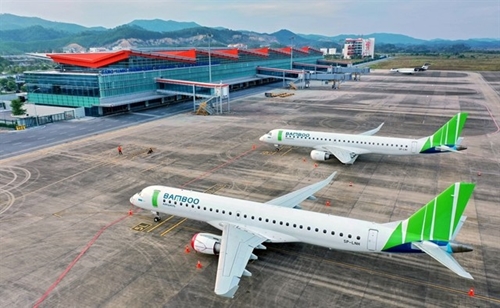Bamboo Airways disclosed the details during its annual shareholders' meeting in Ho Chi Minh City on July 17.
Phan Dinh Tue, Chairman of Bamboo Airways' Board of Directors, revealed that the airline's aircraft fleet has undergone a 19% reduction compared to 2022, as part of a fleet restructuring initiative.
    |
 |
|
Bamboo aircraft on the ground at the Van Don International Airport in Quang Ninh province |
Net revenue from sales and services has increased 6% year-on-year, amounting to over 12.3 trillion VND. The seat occupancy rate has risen to 87%, the average passenger revenue has grown by 14%, and the ancillary revenue has surged by 25%.
In 2023, Bamboo Airways achieved a positive profit after tax of 236.8 billion VND, a significant improvement compared to the nearly negative 20 trillion VND recorded in 2022.
According to Bamboo Airways, the company successfully reduced its total debt obligations by approximately 2 trillion VND in 2023 and no longer has any aircraft leasing debts.
Luong Hoai Nam, Bamboo Airways' CEO, acknowledged the difficulties in airline restructuring but expressed the company's goal to make 2024 the final year of operating at a loss.
From 2025 onwards, Bamboo Airways plans to achieve capital neutrality and move towards profitability in the subsequent years. The company aims to have its shares traded on the stock exchange within a three-year timeframe.
Under the plan, Bamboo Airways is projected to generate a total revenue of nearly 4.9 trillion VND this year, significantly reducing its loss to approximately 1.4 trillion VND.
Despite the ambitious goals ahead, it emphasizes the need for additional capital to meet its operational requirements. The airline states that it still requires approximately 1.69 trillion VND of supplementary funding for the last few months of 2024.
This capital will be sourced through various capital mobilization methods from domestic and international credit institutions and investors, in accordance with legal regulations.
The aircraft fleet is set to expand, with nine Airbus planes initially and a planned increase to 12 by the year's end. If market conditions permit, Bamboo Airways envisions expanding the fleet to 18 aircraft by the end of 2025.
To optimize operational expenses, Bamboo Airways has made changes to its ground service provider, transitioning from SAGS HGS to Pacific Airlines.
By implementing self-handling, the company has achieved a 20% reduction in ground service costs per flight.
Additionally, successful negotiations have led to the planned migration of their Passenger Service System (PSS) from Amadeus to Navitaire, set to be implemented in April 2025.
This transition is expected to result in a minimum saving of 20 million USD over the next five years for the company.
Source: VNA